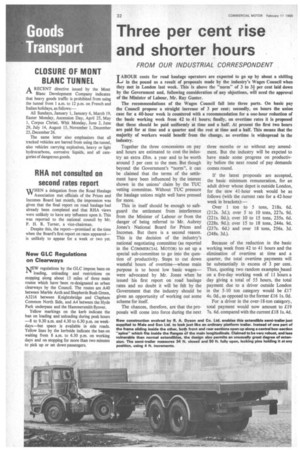Three per cent rise and shorter hours
Page 34

If you've noticed an error in this article please click here to report it so we can fix it.
FROM OUR INDUSTRIAL CORRESPONDENT TABOUR costs for road haulage operators are expected to go up by about a shilling 1-/ in the pound as a result of proposals made by the industry's Wages Council when they met in London last week. This is above the "norm" of 3 to 31 per cent laid down by the Government and, following consideration of any objections, will need the approval of the Minister of Labour, Mr. Ray Gunter.
The recommendations of the Wages Council fall into three parts. On basic pay the Council propose a straight increase of 3 per cent; secondly, on hours the union case for a 40-hour week is countered with a recommendation for a one-hour reduction of the basic working week from 42 to 41 hours; finally, on overtime rates it is proposed that these should be paid uniformly at time and a half. At present the first two hours are paid for at time and a quarter and the rest at time and a half. This means that the majority of workers would benefit from the change, as overtime is widespread in the industry.
Together the three concessions on pay and hours are estimated to cost the industry an extra £8m. a year and to be worth around 5 per cent to the men. But though_ beyond the Government's "norm", it can be claimed that the terms of the settlement have been influenced by the interest shown in the unions' claim by the TUC vetting committee. Without TUG pressure the haulage unions might well have pressed for more.
This in itself should be enough to safeguard the settlement from interference from the Minister of Labour or from the danger of being referred to Mr. Aubrey Jones's National Board for Prices and Incomes. But there is a second reason. This is the decision of the industry's national negotiating committee (as reported in the COMMERCIAL MOTOR) to set up a special sub-committee to go into the question of productivity. Steps to cut down wasteful hours of overtime—whose main purpose is to boost low basic wages— were advocated by Mr. Jones when he issued his first report on road haulage rates and no doubt it will be felt by the Government that the industry should be given an opportunity of working out some scheme for itself.
The chances, therefore, are that the proposals will come into force during the next
three months or so without any amendment. But the industry will be expcted to have made some progress on productivity before the next round of pay demands comes round.
If the latest proposals are accepted, the basic minimum remuneration, for an adult driver whose depot is outside London, for the new 41-hour week would be as follows (with the current rate for a 42-hour week in brackets):—
Over 1 ton to 5 tons, 218s. 6d. (212s. 3d.); over 5 to 10 tons, 227s. 9d. (221s. Od.); over 10 to 15 tons, 235s. 6d. (228s. 9d.); over 15 to 18 tons, 244s. 9d. (237s. 6d.) and over 18 tons, 256s. 3d. (248s. 3d.).
Because of the reduction in the basic working week from 42 to 41 hours and the elimination of overtime at time and a quarter, the total overtime payments will be substantially in excess of 3 per cent. Thus, quoting two random examples based on a five-day working week of 11 hours a day giving a total of 55 hours, the total payment due to a driver outside London in the 5-10 ton category would be £17 4s, Od., as opposed to the former £16 1s. Od.
For a driver in the over-18-ton category, total payment would now amount to £19 7s. 6d. compared with the current £18 is. 4d.




























































































































